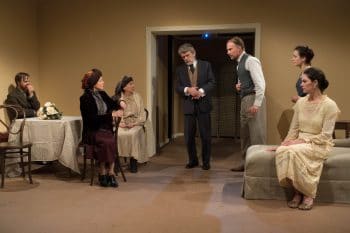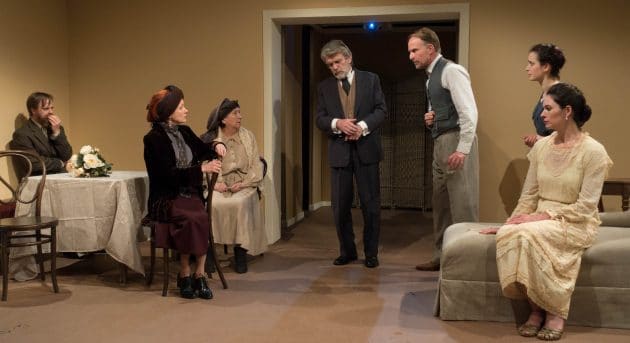Uncle Vanya – Red Stitch
Chekhov’s Uncle Vanya explores the boredom of a few wasted lives playing out on a Russian country estate. It is variously described as a comedy or a tragedy, which heavily depends on the production you are seeing.
Having seen some bold adaptations of Chekhov’s plays in recent years – Simon Stone’s The Cherry Orchard at the Melbourne Theatre Company and Eamon Flack’s Ivanov at Belvoir – I was excited to see a new production of Vanya.
Red Stitch Actors Theatre is not known for staging classic plays. In fact, the niche it fills in the Melbourne theatre ecology is solid productions of mostly new work from the UK and the United States, plays that the mainstage companies probably wouldn’t do. It also strives to develop new Australian writing while supporting its ensemble of actors to develop great performances in great plays.
While boredom and wasted lives can speak to every generation and the changing environment of this Russian estate resonates with modern talk of climate change, their decision to produce Anton Chekhov’s Uncle Vanya, even in a new translation by contemporary and much-lauded American playwright Annie Baker (The Flick, Circle Mirror Transformation) seemed strange. Why this play? Why now?

Producing a play about boredom always risks eliciting boredom, and that has happened here, especially since most of Nadia Tass’s production choices are outmoded and unexciting. The beige set and traditional costumes make the show feel like a museum piece. The choice to use Russian accents, of varying degrees of quality, was distracting and distancing.
A rich ensemble of actors attempt to bring life to these dull characters, but they mostly feel constricted. There are flashes of excitement from Ben Prendergast’s Astrov, who is occasionally allowed to play big, shattering the quiet, static feeling of the rest of the show. Justin Hosking’s Telegin embodies the tragedy and comedy this play could be; we feel sorry for this character who tries to make the best of a bad situation. David Whiteley is mostly unremarkable in the eponymous role, though once a gun comes into the second act, some narrative drive is injected into the whole affair and Whiteley shows moments of the exciting actor he’s been in previous Red Stitch shows like Red Sky Morning and Farragut North.
Vanya is a difficult play to make work because of the characters’ humdrum circumstances and it requires a bold vision to lift it off the page. Tass needed to find more humour in the piece; some of the melodrama invites it and we see it but it feels like we are laughing at the characters rather than with them. But rarely did the show invite laughter at all.
I’m always excited when theatre companies try things that are outside their remit, and bold choices are an opportunity to excite audiences. But I don’t think Red Stitch’s choice to program a traditional play, even in a new translation, and stage it in such a tired, dated way is at all bold. Why this play? Why now? Sometimes it’s enough to revisit a classic to remind us why it’s a classic; this production just left me asking “Why Red Stitch? Why?”





“Why this play? Why now?”.
Really?
A play about disaffected working-class who are brought to a standstill because the intelligentsia elite? Where a main character extols the virtues of conservation, and condemns the rapacious nature of humanity. Where a beautiful woman is objectified and despite higher intentions is largely rendered an ornament? Where a life of purpose is idealised over the notion of fame or notoriety? Where each character is exactly one generation removed from the next, and heartbroken all the same.
I think the point here is that despite this period retelling, we recognise ourselves, and it could have been performed yesterday. Chekhov categorised Vanya as a comedy indeed, but I’m not so sure seeing this production… But each to their own I suppose, perhaps modern audiences need such texts contemporised to 1970’s Dandenong aka Mr Stone before they can relate?
TH
Hello.